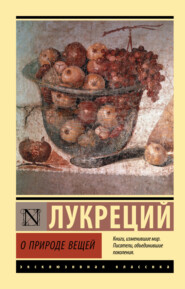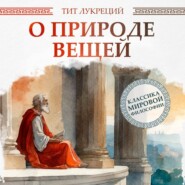По всем вопросам обращайтесь на: info@litportal.ru
(©) 2003-2025.
✖
On the Nature of Things
Настройки чтения
Размер шрифта
Высота строк
Поля
And, after being forward cast, to be
Reined up, whereat it settles back again.
So seest thou not, how, though external force
Drive men before, and often make them move,
Onward against desire, and headlong snatched,
Yet is there something in these breasts of ours
Strong to combat, strong to withstand the same?—
Wherefore no less within the primal seeds
Thou must admit, besides all blows and weight,
Some other cause of motion, whence derives
This power in us inborn, of some free act.—
Since naught from nothing can become, we see.
For weight prevents all things should come to pass
Through blows, as 'twere, by some external force;
But that man's mind itself in all it does
Hath not a fixed necessity within,
Nor is not, like a conquered thing, compelled
To bear and suffer,—this state comes to man
From that slight swervement of the elements
In no fixed line of space, in no fixed time.
Nor ever was the stock of stuff more crammed,
Nor ever, again, sundered by bigger gaps:
For naught gives increase and naught takes away;
On which account, just as they move to-day,
The elemental bodies moved of old
And shall the same hereafter evermore.
And what was wont to be begot of old
Shall be begotten under selfsame terms
And grow and thrive in power, so far as given
To each by Nature's changeless, old decrees.
The sum of things there is no power can change,
For naught exists outside, to which can flee
Out of the world matter of any kind,
Nor forth from which a fresh supply can spring,
Break in upon the founded world, and change
Whole nature of things, and turn their motions about.
ATOMIC FORMS AND THEIR COMBINATIONS
Now come, and next hereafter apprehend
What sorts, how vastly different in form,
How varied in multitudinous shapes they are—
These old beginnings of the universe;
Not in the sense that only few are furnished
With one like form, but rather not at all
In general have they likeness each with each,
No marvel: since the stock of them's so great
That there's no end (as I have taught) nor sum,
They must indeed not one and all be marked
By equal outline and by shape the same.
Moreover, humankind, and the mute flocks
Of scaly creatures swimming in the streams,
And joyous herds around, and all the wild,
And all the breeds of birds—both those that teem
In gladsome regions of the water-haunts,
About the river-banks and springs and pools,
And those that throng, flitting from tree to tree,
Through trackless woods—Go, take which one thou wilt,
In any kind: thou wilt discover still
Each from the other still unlike in shape.
Nor in no other wise could offspring know
Mother, nor mother offspring—which we see
They yet can do, distinguished one from other,
No less than human beings, by clear signs.
Thus oft before fair temples of the gods,
Beside the incense-burning altars slain,
Drops down the yearling calf, from out its breast
Breathing warm streams of blood; the orphaned mother,
Ranging meanwhile green woodland pastures round,
Knows well the footprints, pressed by cloven hoofs,
With eyes regarding every spot about,
For sight somewhere of youngling gone from her;
And, stopping short, filleth the leafy lanes
With her complaints; and oft she seeks again
Within the stall, pierced by her yearning still.
Nor tender willows, nor dew-quickened grass,
Nor the loved streams that glide along low banks,
Can lure her mind and turn the sudden pain;
Nor other shapes of calves that graze thereby
Distract her mind or lighten pain the least—
So keen her search for something known and hers.
Moreover, tender kids with bleating throats
Do know their horned dams, and butting lambs
The flocks of sheep, and thus they patter on,
Unfailingly each to its proper teat,
As nature intends. Lastly, with any grain,
Thou'lt see that no one kernel in one kind
Is so far like another, that there still
Is not in shapes some difference running through.
By a like law we see how earth is pied
With shells and conchs, where, with soft waves, the sea
Beats on the thirsty sands of curving shores.
Wherefore again, again, since seeds of things
Exist by nature, nor were wrought with hands
After a fixed pattern of one other,
They needs must flitter to and fro with shapes
In types dissimilar to one another.
Reined up, whereat it settles back again.
So seest thou not, how, though external force
Drive men before, and often make them move,
Onward against desire, and headlong snatched,
Yet is there something in these breasts of ours
Strong to combat, strong to withstand the same?—
Wherefore no less within the primal seeds
Thou must admit, besides all blows and weight,
Some other cause of motion, whence derives
This power in us inborn, of some free act.—
Since naught from nothing can become, we see.
For weight prevents all things should come to pass
Through blows, as 'twere, by some external force;
But that man's mind itself in all it does
Hath not a fixed necessity within,
Nor is not, like a conquered thing, compelled
To bear and suffer,—this state comes to man
From that slight swervement of the elements
In no fixed line of space, in no fixed time.
Nor ever was the stock of stuff more crammed,
Nor ever, again, sundered by bigger gaps:
For naught gives increase and naught takes away;
On which account, just as they move to-day,
The elemental bodies moved of old
And shall the same hereafter evermore.
And what was wont to be begot of old
Shall be begotten under selfsame terms
And grow and thrive in power, so far as given
To each by Nature's changeless, old decrees.
The sum of things there is no power can change,
For naught exists outside, to which can flee
Out of the world matter of any kind,
Nor forth from which a fresh supply can spring,
Break in upon the founded world, and change
Whole nature of things, and turn their motions about.
ATOMIC FORMS AND THEIR COMBINATIONS
Now come, and next hereafter apprehend
What sorts, how vastly different in form,
How varied in multitudinous shapes they are—
These old beginnings of the universe;
Not in the sense that only few are furnished
With one like form, but rather not at all
In general have they likeness each with each,
No marvel: since the stock of them's so great
That there's no end (as I have taught) nor sum,
They must indeed not one and all be marked
By equal outline and by shape the same.
Moreover, humankind, and the mute flocks
Of scaly creatures swimming in the streams,
And joyous herds around, and all the wild,
And all the breeds of birds—both those that teem
In gladsome regions of the water-haunts,
About the river-banks and springs and pools,
And those that throng, flitting from tree to tree,
Through trackless woods—Go, take which one thou wilt,
In any kind: thou wilt discover still
Each from the other still unlike in shape.
Nor in no other wise could offspring know
Mother, nor mother offspring—which we see
They yet can do, distinguished one from other,
No less than human beings, by clear signs.
Thus oft before fair temples of the gods,
Beside the incense-burning altars slain,
Drops down the yearling calf, from out its breast
Breathing warm streams of blood; the orphaned mother,
Ranging meanwhile green woodland pastures round,
Knows well the footprints, pressed by cloven hoofs,
With eyes regarding every spot about,
For sight somewhere of youngling gone from her;
And, stopping short, filleth the leafy lanes
With her complaints; and oft she seeks again
Within the stall, pierced by her yearning still.
Nor tender willows, nor dew-quickened grass,
Nor the loved streams that glide along low banks,
Can lure her mind and turn the sudden pain;
Nor other shapes of calves that graze thereby
Distract her mind or lighten pain the least—
So keen her search for something known and hers.
Moreover, tender kids with bleating throats
Do know their horned dams, and butting lambs
The flocks of sheep, and thus they patter on,
Unfailingly each to its proper teat,
As nature intends. Lastly, with any grain,
Thou'lt see that no one kernel in one kind
Is so far like another, that there still
Is not in shapes some difference running through.
By a like law we see how earth is pied
With shells and conchs, where, with soft waves, the sea
Beats on the thirsty sands of curving shores.
Wherefore again, again, since seeds of things
Exist by nature, nor were wrought with hands
After a fixed pattern of one other,
They needs must flitter to and fro with shapes
In types dissimilar to one another.







